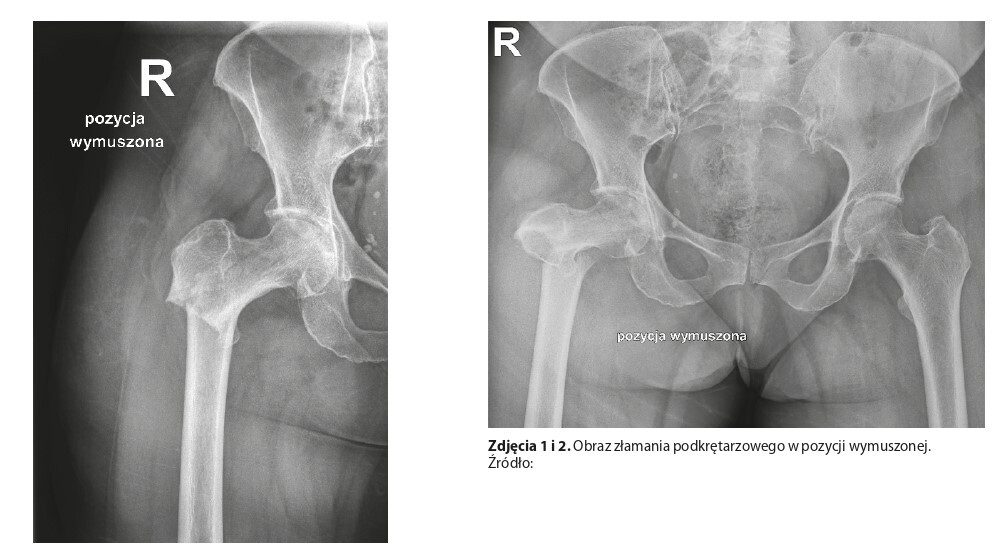CASE REPORT
Choice of treatment method and its consequences – a case report
1
Wydział Nauk Medycznych i Nauk o Zdrowiu, Uniwersytet Radomski im. Kazimierza Pułaskiego w Radomiu, Polska
Corresponding author
Jan Paweł Wójtowicz
Wydział Nauk Medycznych i Nauk o Zdrowiu, Uniwersytet Radomski im. Kazimierza Pułaskiego w Radomiu, Polska
Wydział Nauk Medycznych i Nauk o Zdrowiu, Uniwersytet Radomski im. Kazimierza Pułaskiego w Radomiu, Polska
Med Og Nauk Zdr. 2024;30(4):329-333
KEYWORDS
osteoarthritiscase reportquality of lifeelderly patientForage proceduresubtrochanteric femoral fracture
TOPICS
ABSTRACT
Selection of a treatment method is a crucial step in ensuring an optimal quality of life and improving patient’s mobility, which
exerts an effect on the course of the disease, effectiveness of therapy, speed of recovery, and patient’s comfort. Osteoarthritis (OA) affecting primarily persons aged over 65 is characterized by the degeneration of joint cartilage, bone remodelling, and inflammation of joint tissues. Diagnosis includes imaging techniques, such as X-ray and MRI, as well as assessment of the severity of changes based on the Kellgren-Lawrence scale. Treatment of osteoarthritis aims to reduce pain and improve patient’s functional efficiency, using non-pharmacological methods, pharmacological treatments, physiotherapy, and surgical interventions. The described case concerns a 72-year-old female with advanced degenerative changes, who had undergone the Forage procedure. Three weeks later, a subtrochanteric femoral fracture occurred, requiring further surgical intervention. In geriatric patients, a prolonged convalescence can significantly affect the perceived quality of life; thus, medical decisions should consider not only medical indications, but also the patient’s perspective and expectations regarding the quality of further life. The aim of the study is to provide a broader view of geriatric patients, taking into account their unique health needs, challenges and the importance of an individual approach to treatment and care
REFERENCES (22)
1.
Kościelna P, Pogorzała AM. Badanie funkcjonalne stawu biodrowego w przypadku zmian zwyrodnieniowych. In: Borowicz AM, editor. Innowacyjność i tradycja w fizjoterapii. Poznań: Wyższa Szkoła Edukacji i Terapii w Poznaniu; 2017. p. 51–70.
2.
Romanowski W, Zdanowska A, Romanowski M. Choroba zwyrodnieniowa stawów – aktualne standardy leczenia. Rheumatology Forum. 2016;2(2):52–57.
3.
Materkowski M. Kompleksowe spojrzenie na chorobę zwyrodnieniową stawów zastosowanie aceklofenaku w leczeniu tej jednostki chorobowej. Ortopedia Traumatologia Rehabilitacja. 2019;21(4):307–312.
4.
Klimiuk PA, Kuryliszyn-Moskal A. Choroba zwyrodnieniowa stawów. Po Dyplomie. https://podyplomie.pl/system/p... (access: 2023.06.29).
5.
Palczewski P. Imaging diagnosis of osteoarthritis. Polish Journal of Sports Medicine. 2021;37(1):103–115.
6.
Klimiuk PA, Kuryliszyn-Moskal A. Choroba zwyrodnieniowa stawów. Po Dyplomie. https://podyplomie.pl/system/p... (access: 2023.06.30).
7.
Istrati J. Jakie zabiegi fizjoterapeutyczne są wskazane u chorego ze zmianami zwyrodnieniowymi stawu biodrowego?. Medycyna praktyczna. https://www.mp.pl/reumatologia... (access: 2024.05.29).
8.
Osiecka A, Matuszewska-Zbrońska H, Drzastwa WJ, Bujak-Rosenbeiger E, Mizgała E. Choroba zwyrodnieniowa stawów w praktyce lekarza rodzinnego. Annales Academiae Medicae Silesiensis. 2017;71(1):407–417.
9.
Zimmermann-Górska I, Goncerz G, Szczepański L. Choroba zwyrodnieniowa stawów, Medycyna praktyczna. https://www.mp.pl/interna/chap.... (access: 2024.05.29).
10.
Złotorowicz M, Czubak J. Unaczynienie głowy kości udowej. Postępy Nauk Medycznych. 2017;6:326–331.
11.
Lin L, Jiao Y, Luo XG, Zhang JZ, Yin HL, Ma L, Chen H. Modified technique of advanced core decompression for treatment of femoral head osteonecrosis. World Journal of Clinical Cases. 2020;8(13):2749–2757. https://doi.org/10.12998%2Fwjc....
12.
Korkosz M, Goncerz G. Martwica jałowa kości. Medycyna praktyczna. https://www.mp.pl/interna/chap.... (access: 2024.06.03).
13.
Szczecińska A, Urban J, Kukowska D. Występowanie powikłań po endoprotezoplastyce stawu biodrowego. Zeszyty Naukowe WSA w Łomży. 2016;64:101–113.
14.
Halme ALE, Roshanov PS, Tornberg SV, et al. Timing of Major Postoperative Bleeding Among Patients Undergoing Surgery. JAMA Netw Open. 2024;7(4). https://doi.org/10.1001/jamane....
15.
Yang J, Zhang X, Liang W. A retrospective analysis of factors affecting surgical site infection in orthopaedic patients. Journal of International Medical Research. 2020;48(4). https://doi.org/10.1177/030006....
16.
Barton CB, Wang DL, An Q, Brown TS, Callaghan JJ, Otero JE. Two-stage exchange arthroplasty for periprosthetic joint infection following total hip or knee arthroplasty is associated with high attrition rate and mortality. The Journal of Arthroplasty. 2020;35(5):1384–1389. https://doi.org/10.1016/j.arth....
17.
Montewka M, Skrzek A, Plewik D, Rudzki S, Wysokiński A, Kozioł-Montewka M. Zakażenia miejsca operowanego – charakterystyka czynników ryzyka, endogennych źródeł zakażenia i metody zapobiegania. Postępy Mikrobiologiczne. 2012;51(3):227–235.
18.
Szewczyk M, Cwajda-Białasik J, Mościcka P, et al. Zalecenia profilaktyki zakażeń miejsca operowanego i stosowania antybiotykoterapii w okresie przedoperacyjnej opieki pielęgniarskiej na oddziałach zabiegowych. Pielęgniarstwo Chirurgiczne i Angiologiczne. 2015;2:39–55.
19.
Bage T, Power DM. Iatrogenic peripheral nerve injury: a guide to management for the orthopaedic limb surgeon. EFORT Open Reviews. 2021;6(8):607–617. https://doi.org/10.1302/2058-5....
20.
Łęgosz P, Sarzyńska S, Małdyk P. Żylna choroba zakrzepowo-zatorowa u pacjentów po urazach i zabiegach ortopedycznych. Praktyczna Ortopedia i Traumatologia. 2019;14.
21.
Chmielewski D, Górecki A, Kusz D, Małdyk P, Marczyński W, Tomkowski W. Zasady profilaktyki żylnej choroby zakrzepowo-zatorowej w ortopedii i traumatologii narządu ruchu. Ortopedia Traumatologia Rehabilitacja. Medsportpress. 2009;1(6):86–92.
22.
Konarski W, Poboży T, Kotela A, Śliwczyński A, Kotela I, Hordowicz M, Krakowiak J. The Risk of Avascular Necrosis Following the Stabilization of Femoral Neck Fractures: A Systematic Review and Meta-Analysis. International Journal of Environmental Research and Public Health. 2022;19(16):10050. https://doi.org/10.3390/ijerph....
Share
RELATED ARTICLE
We process personal data collected when visiting the website. The function of obtaining information about users and their behavior is carried out by voluntarily entered information in forms and saving cookies in end devices. Data, including cookies, are used to provide services, improve the user experience and to analyze the traffic in accordance with the Privacy policy. Data are also collected and processed by Google Analytics tool (more).
You can change cookies settings in your browser. Restricted use of cookies in the browser configuration may affect some functionalities of the website.
You can change cookies settings in your browser. Restricted use of cookies in the browser configuration may affect some functionalities of the website.



